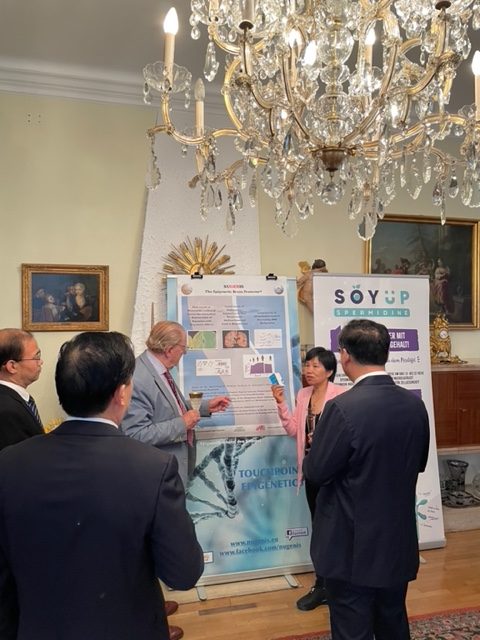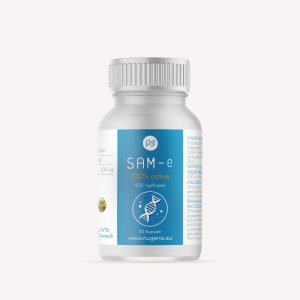
Epigenetics and Human Health: How Life Experiences Rewrite Our Genes – with Eduard Rappold
“Rethinking Health: The Power of Epigenetics” – Podcast Script
Host:
“Welcome to today’s episode. We’ll dive into a topic that’s reshaping medicine, psychology, and even how we see ourselves: epigenetics.
My guest is Eduard Rappold – author, researcher, and co-creator of the concept of applied epigenetics. Eduard, it’s great to have you here!”
Eduard:
“Thank you so much. I’m excited to share this with your audience. Epigenetics isn’t just science – it’s something that touches all of our lives.”
What is Epigenetics?
Host:
“Let’s start simple. People hear the word epigenetics – but most don’t really know what it means. Could you explain it in plain language?”
Eduard:
“Of course. Think of your DNA as the script of a play. Epigenetics is the director’s notes. It tells the actors – the genes – when to come on stage, how loud to speak, when to stay silent.
So the story is the same – but the way it’s performed can change completely.”
Host:
“That’s a powerful image. So environment is constantly rewriting how the script is played?”
Eduard:
“Exactly. Food, movement, sleep, stress, relationships – they all change how our genes are read.
Take the famous NASA twins – Scott and Mark Kelly. One spent a year in space, the other stayed on Earth. When he came back, scientists found epigenetic differences – even though they have identical DNA.”
Host:
“Wow. So experience literally gets under our skin.”
Eduard:
“Yes. And even more striking are studies on childhood. Researchers Michael Meaney and Moshe Szyf showed with rats: pups cared for by nurturing mothers had different stress-gene regulation than those neglected. That epigenetic mark lasted a lifetime. Love – or its absence – writes itself into biology.”
Primal Emotions and Stress
Host:
“You often speak about primal emotions. What do you mean, and why do they matter?”
Eduard:
“Primal emotions are deep, ancient feelings: fear, anger, shame, guilt. They helped humans survive. But in modern life, they often turn into chronic stress. And stress leaves epigenetic fingerprints – for example on genes for the stress hormone receptor, or the oxytocin receptor.”
Host:
“So our feelings are literally rewriting our genes?”
Eduard:
“Yes. Look at tree shrews – small mammals living in constant social stress. Their stress systems adapt epigenetically. Humans aren’t different. Chronic fear or shame accelerates inflammation, aging – even Alzheimer’s risk.”
The “WEIRD” Human and Morality
Host:
“You also talk about the ‘strange’ or ‘WEIRD’ human. What’s that about?”
Eduard:
“That idea comes from Joseph Henrich. WEIRD stands for Western, Educated, Industrialized, Rich, Democratic. These societies are unique – they shifted from shame-based cultures to guilt-based ones. That moral shift left epigenetic traces in our brains.”
Host:
“Moral codes as epigenetics – that sounds unusual.”
Eduard:
“Yes – but think about it. Institutions like church, courts, and schools had to manufacture morality. They turned shame into guilt to make individuals self-regulating. That shaped stress systems, dopamine pathways, oxytocin networks. Culture literally reprogrammed our biology.”
Can We Change Our Epigenetics?
Host:
“All right – this sounds powerful. But what can people do to influence their own epigenetics?”
Eduard:
“A lot! Think of it as epigenetic hygiene. Balanced diet, movement, quality sleep, reducing stress. Even meditation or music changes gene expression.
One fascinating example is SAM-e – short for S-adenosylmethionine. It’s the body’s primary methyl-group donor. That means whenever your DNA needs a methyl group to regulate gene activity – to switch a gene on or off in a healthy way – SAM-e is the main supplier. Without it, your epigenetic system can’t function properly.
Stress, aging, or liver problems can deplete SAM-e. But balanced nutrition – and sometimes supplementation – can restore it.
That’s why SAM-e is being researched not just for mood and joint health, but also as a protector of DNA stability and epigenetic balance.
You could say: SAM-e is the currency of methylation. Keeping it in balance is one of the keys to long-term brain health and resilience.”
Host:
“So food and molecules like SAM-e act as epigenetic medicine?”
Eduard:
“Exactly. But not just food. Psychotherapy, mindfulness, even resonance experiences like deep connection with others – they all reshape our gene activity. And medicine is testing real epigenetic drugs – like HDAC inhibitors – in cancer and Alzheimer’s research.”
Society and Ethics
Host:
“If epigenetics is so powerful – what does that mean for society?”
Eduard:
“It means huge responsibility. Trauma, poverty, pollution – they don’t just affect one life. They echo epigenetically into the next generation.
But the reverse is true too: care, education, safety, meaningful connection – they also get written into our biology and passed on.”
Host:
“So we’re not prisoners of our genes?”
Eduard:
“Exactly. We are co-authors. Erich Fromm once said: Freedom isn’t just the absence of constraint – it’s the ability to take responsibility. That’s what epigenetics teaches us.”
Closing
Host:
“If our listeners could remember just one message from this conversation – what should it be?”
Eduard:
“That every experience, every relationship, every choice leaves marks in our biological memory. We can shape those marks – for ourselves and for generations to come. Epigenetics turns science into lived responsibility.”
Host:
“Thank you, Eduard, for this inspiring conversation!”
Eduard:
“Thank you – and thanks to everyone who joined us.”
Eduard:
“Before we close, just a quick note: Everything we’ve shared today is for educational purposes only. It’s not a replacement for medical advice. So if you have health questions, please always talk to a qualified healthcare professional.
This episode was brought to you by NUGENIS – specialized in epigenetically active nutritional supplements.
I’m Eduard Rappold – thank you for listening, and take care of your health.”
http://nugenis.eu/shop

